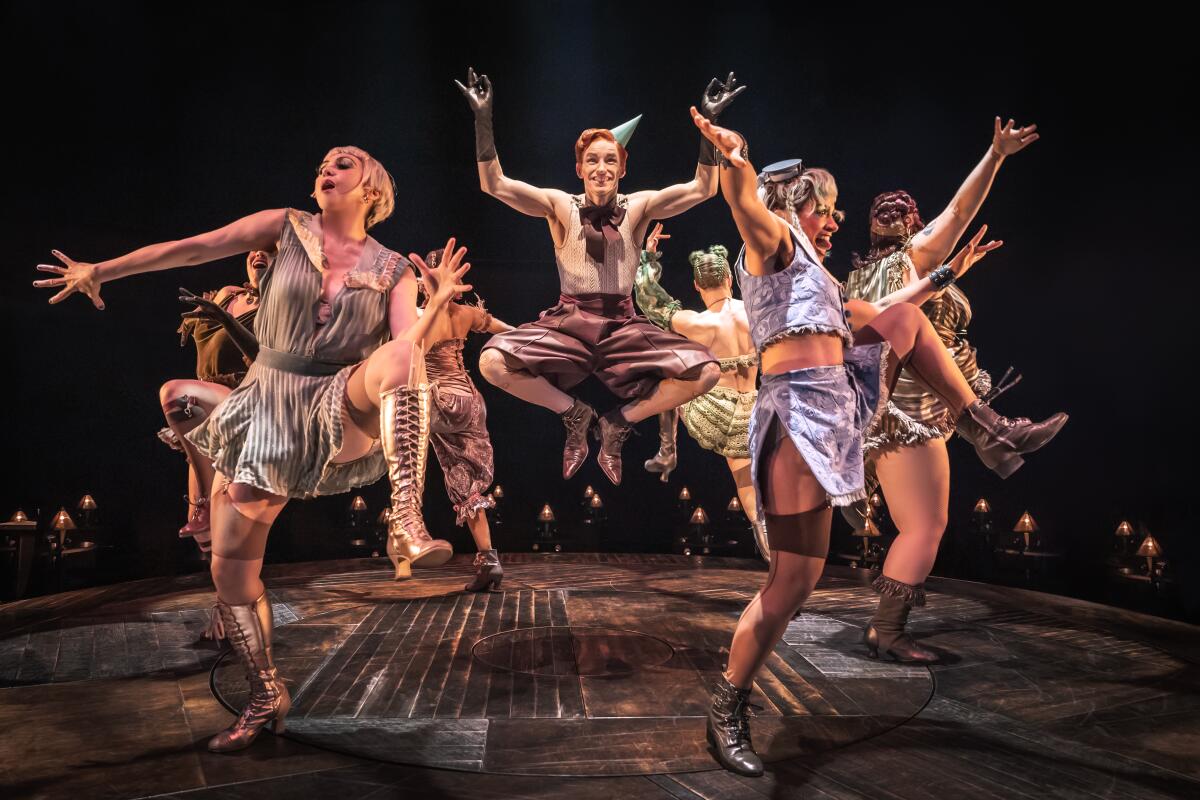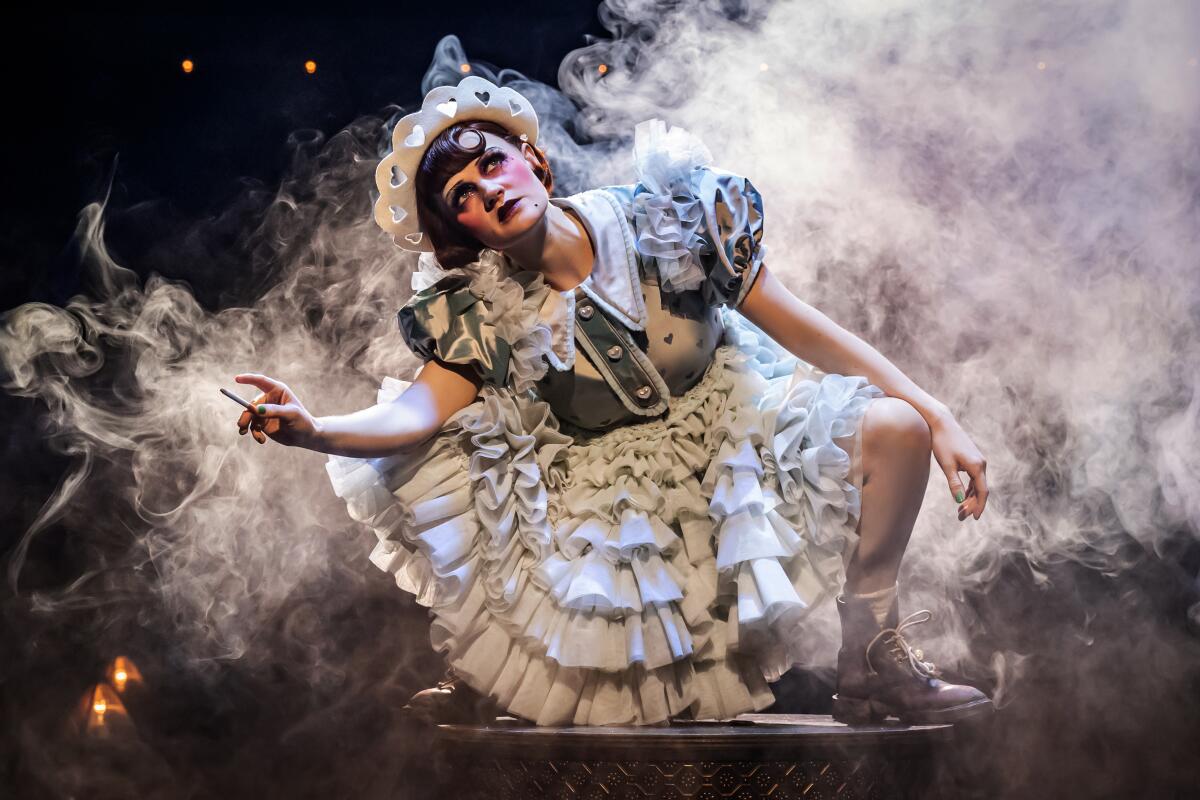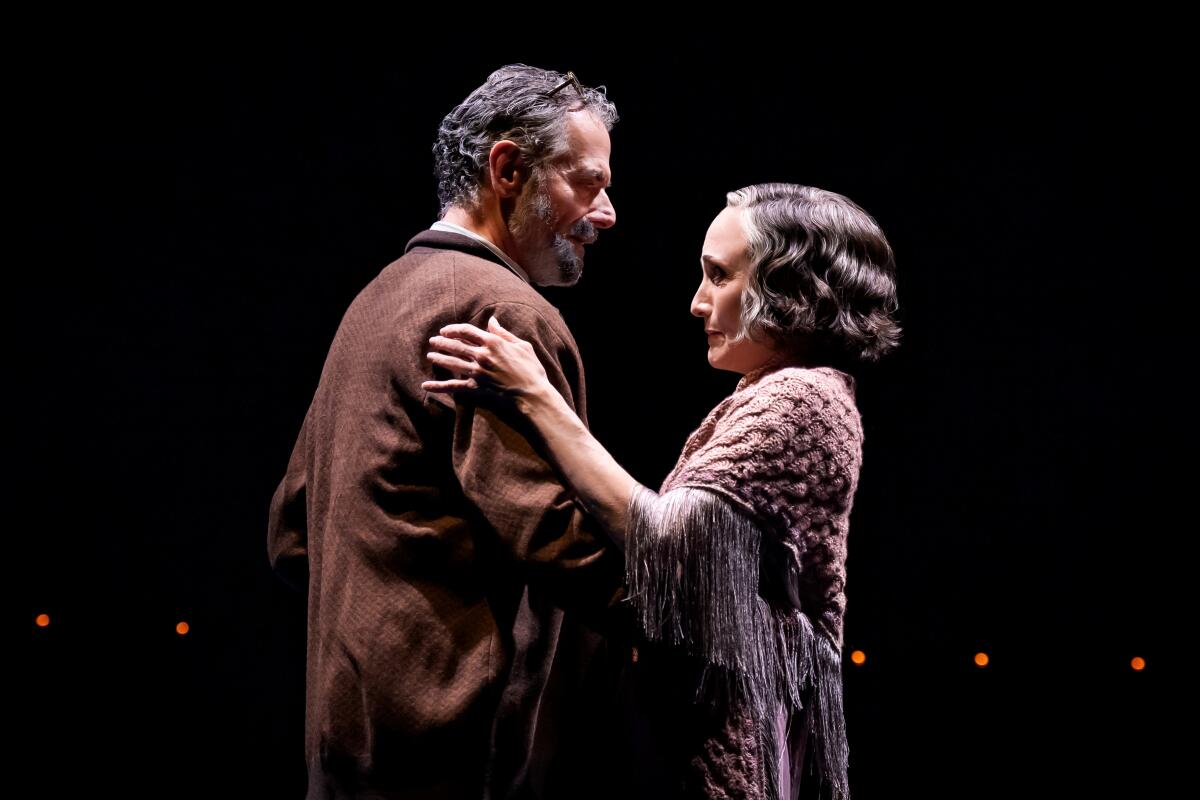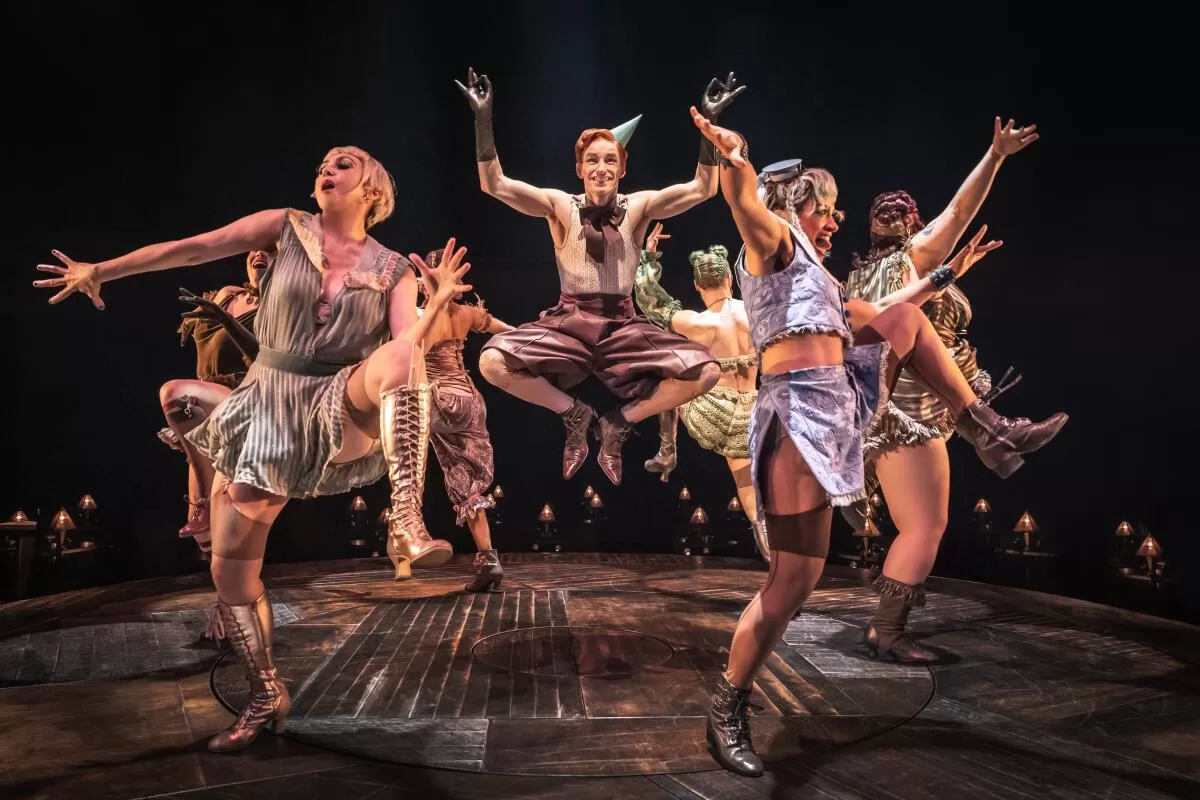The venue has been transformed into the Kit Kat Club, the Weimar era Berlin nightspot, where the naughty pastiche score by John Kander and Fred Ebb gets to strut its decadent stuff.
A prologue invites theatergoers to immerse themselves in the boozy, burlesque spirit of the show before it properly begins. The bar is buzzing as dancers of freaky eclecticism offer a taste of the risqué entertainment awaiting every fetish.
The theater’s traditional proscenium stage, which Lea Michele not so long ago set ablaze in her performance as Fanny Brice in the revival of “Funny Girl,” has been reconfigured into an in-the-round auditorium. A woman seated in front of me asked if I’d like a glass of wine. I declined. I prefer my intoxication at the theater to be administered artistically, and there’s the rub with this erratic revival.
The production, a British import directed by Rebecca Frecknall, won seven Olivier Awards, including best musical. But something vital has been lost in the transatlantic crossing.

(Marc Brenner)
Eddie Redmayne, whose kinetic portrayal of the Emcee was the talk of London, reprises his performance in the role that earned Joel Grey and Alan Cumming eternal glory. Winner of an Oscar (for playing Stephen Hawking in “The Theory of Everything”) and a Tony Award (for his featured performance in “Red”), Redmayne puts his own androgynous stamp on the character in a spellbinding display that is as physically precise as it is theatrically audacious.
Decked out like a marionette clown with sexual proclivities that refuse to be hemmed in by official categories, he resembles a Howdy Doody figure reconceived for a wild photo spread in Vogue Hommes. His sinewy torso twisting with whiplash grace, his arms undulating like snakes that have fallen under the charm of a clarinet, Redmayne elevates the production not by his level of musical showmanship but by his potently deployed stage presence.
If you’re looking for powerhouse singing, this outing of “Cabaret” will sorely disappoint. The production is faithful to the seedy Berlin aesthetic of the show’s locale. The characters in Joe Masteroff’s book, based on the play “I Am a Camera” by John van Druten that was itself based on stories by Christopher Isherwood, aren’t meant to be Broadway Olympians.

Gayle Rankin as Sally Bowles in the 2024 Broadway revival of “Cabaret.”
(Marc Brenner)
There’s a school of thought that Liza Minnelli, who won an Oscar for her rendition of Sally Bowles in the brilliant film adaptation of “Cabaret,” was too accomplished a performer for the role. I’ve never given much credence to this argument, believing that movie musicals, like musicals generally, are elevated by virtuoso singing and dancing.
But in any case, this production takes this notion of fictional integrity to a ludicrous extreme in the casting of Gayle Rankin as Sally Bowles. Jessie Buckley, a renowned singer and gripping dramatic actor, won (along with Redmayne) an Olivier for her performance in the London run. Rankin appears to have stepped into an interpretation of the part that she hasn’t the same skill set to pull off. Not only is her singing raucous but her characterization is off-putting, even antipathetic.
Why Clifford Bradshaw (Ato Blankson-Wood), the bisexual American writer who is on the lam in Berlin from his parents’ conventional expectations, has decided to shack up with Sally, a tawdry chanteuse whose sad-sweet charm is nowhere in evidence, is one of the unanswered mysteries of this revival.
Rankin’s Sally strains after dramatic effects that fail to materialize. “Cabaret” has such a rich Broadway history. Natasha Richardson, Jennifer Jason Leigh, Michelle Williams and Emma Stone are part of the show’s glorious New York track record. The role can accommodate a broad spectrum of musical and dramatic talents, to say nothing of varying approaches to the character.
You don’t have to approve of Sally’s morality, but you have to care about the character’s fate. And that’s what Rankin’s unalluring performance prevents. What does it say about a revival of “Cabaret” in which I kept hoping that Fraulein Schneider (Bebe Neuwirth) would change the locks of her boardinghouse to keep Sally out of the production?
But there are other problems in the ensemble. The scenes between Sally and Blankson-Wood’s Clifford cry out for an acting coach — not a thought I can remember having at a premium Broadway revival of a classic musical in recent seasons.
I was relieved whenever the dependable veterans of the company, Neuwirth and Steven Skybell in the role of Herr Schultz — were front and center. But Neuwirth’s diminished singing only accentuated the production’s lackluster musicality — a weird irony given Neuwirth‘s Broadway pedigree.

Steven Skybell and Bebe Neuwirth in the 2024 Broadway revival of “Cabaret.”
(Marc Brenner)
The staging is at its best when it’s in circular motion. The choreography by Julia Cheng doesn’t aim to dazzle, but the fluidity is hypnotic nonetheless. The motley Kit Kat chorus crew adds ribald vibrancy to the swirl.
Redmayne is the reason to see this production, though as captivating as his performance is, he cannot rescue this misguided revival on his own. I’m also not entirely clear on how Frecknall is interpreting the Emcee’s role. The character’s queer vulnerability — the sense of a last gasp of misfit sexual freedom before the Nazis kill the party — is lost in the shuffle of the political menace that Redmayne begins to reflect in costuming and affect that become ever more expressionistic.
The Nazi peril is treated a touch too decoratively, though when Ernst Ludwig (a convincing Henry Gottfried), a newfound German friend of Clifford with questionable business dealings, takes off his coat and reveals a swastika armband the audience emits a collective sound of shock. But otherwise, the emotional impact of the story is nil.
Musically, the effect is even less. Usually, when Sally belts “Maybe This Time” in the first act, I never want the moment to end. Not here. Normally, I have to restrain myself from answering the title-song summons as the show moves toward its big finish. (What good is sitting alone in your room or anywhere for that matter with music this glorious in the world?) Sadly, in this grating rendition, I was recoiling from the din of a two-bit cabaret floozy and glancing at my watch.
